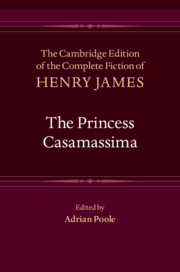Book contents
- Frontmatter
- Contents
- List of Illustrations
- Acknowledgements
- List of Abbreviations
- General Editors’ Preface
- General Chronology of James’s Life and Writings
- Introduction
- Textual Introduction
- Chronology of Composition and Production
- Bibliography
- The Princess Casamassima
- Glossary of Foreign Words and Phrases
- Notes
- Textual Variants I: Substantive Variants up to Copy Text
- Textual Variants II: Substantive Variants after Copy Text
- Emendations
- Appendix: Preface to New York Edition
XXXI
Published online by Cambridge University Press: 11 April 2021
- Frontmatter
- Contents
- List of Illustrations
- Acknowledgements
- List of Abbreviations
- General Editors’ Preface
- General Chronology of James’s Life and Writings
- Introduction
- Textual Introduction
- Chronology of Composition and Production
- Bibliography
- The Princess Casamassima
- Glossary of Foreign Words and Phrases
- Notes
- Textual Variants I: Substantive Variants up to Copy Text
- Textual Variants II: Substantive Variants after Copy Text
- Emendations
- Appendix: Preface to New York Edition
Summary
Hyacinth spent three days, after his return to London, in a process which he supposed to be the quest of a lodging; but in reality he was pulling himself together for the business of his livelihood — an effort he found by no means easy or agreeable. As he had told the Princess, he was demoralised, and the perspective of Mr. Crookenden's dirty staircase had never seemed so steep. He lingered on the brink, before he plunged again into Soho; he wished not to go back to the shop till he should be settled, and he delayed to get settled in order not to go back to the shop. He saw no one during this interval, not even Mr. Vetch; he waited to call upon the fiddler till he should have the appearance of not coming as a beggar or a borrower — have recovered his employment and be able to give an address, as he had heard Captain Sholto say. He went to South Street — not meaning to go in at once but wishing to look at the house — and there he had the surprise of perceiving a bill of sale in the window of the Princess's late residence. He had not expected to find her in town (he had heard from her the last time three weeks before, and then she said nothing about her prospects), but he was puzzled by this indication that she had moved away altogether. There was something in this, however, which he felt that at bottom he had looked for; it appeared a proof of the justice of a certain suspicious, uneasy sentiment from which one could never be quite free, in one's intercourse with the Princess — a vague apprehension that one might suddenly stretch out one's hand and miss her altogether from one's side. Hyacinth decided to ring at the door and ask for news of her; but there was no response to his summons: the stillness of an August afternoon (the year had come round again from his first visit) hung over the place, the blinds were down and the caretaker appeared to be absent. Under these circumstances Hyacinth was much at a loss; unless, indeed, he should address a letter to his wonderful friend at Medley.
- Type
- Chapter
- Information
- The Princess Casamassima , pp. 309 - 316Publisher: Cambridge University PressPrint publication year: 2020

